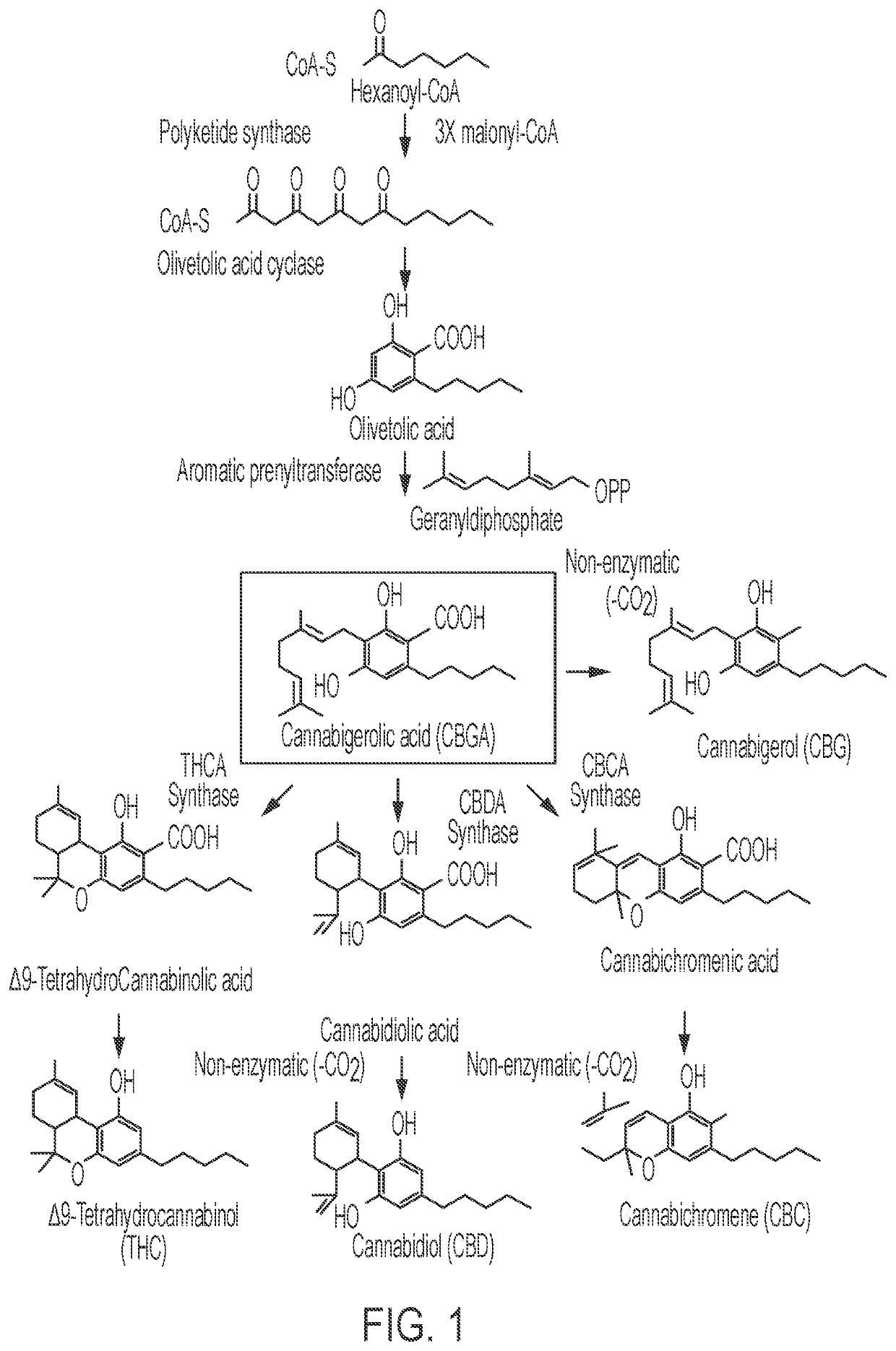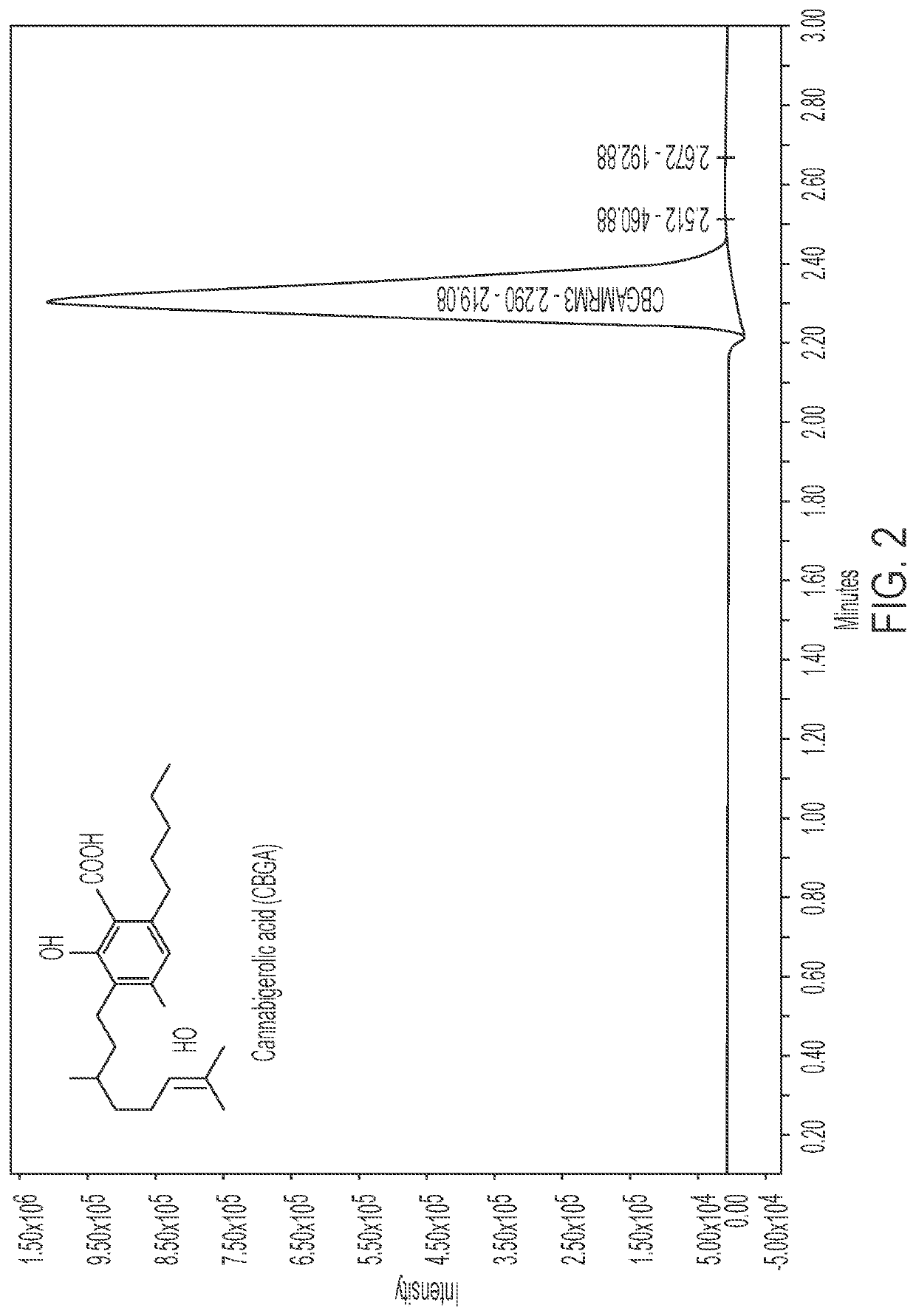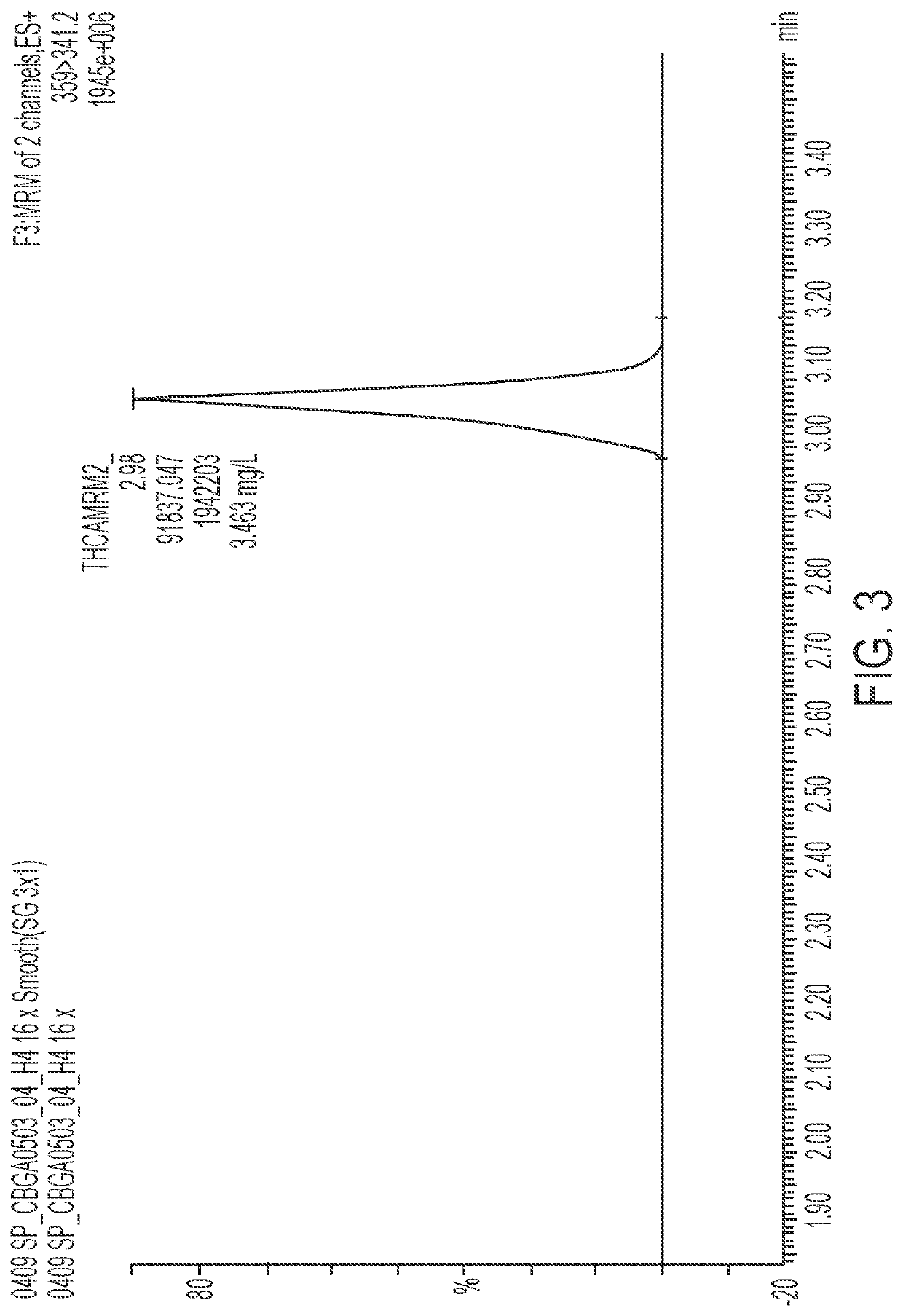Microorganisms and methods for the fermentation of cannabinoids
a technology of microorganisms and cannabinoids, applied in the direction of oxidoreductases, biochemical apparatus and processes, enzymes, etc., can solve the problems of difficult purification to provide a single compound needed for pharmaceutical applications, difficult to reproduce identical cannabinoid profiles in plants using extraction processes, and high cost of chemical synthesis of various cannabinoids, etc., to achieve the effect of increasing the efficiency of cbga
- Summary
- Abstract
- Description
- Claims
- Application Information
AI Technical Summary
Benefits of technology
Problems solved by technology
Method used
Image
Examples
example 1
Plasmid Construction
[0313]A prenyltransferase of interest was identified. The amino acid sequence (SEQ ID NO: 1) was used by Genscript to design and synthesize the yeast codon optimized sequence coding for the prenyltransferase and used in the experiments.
[0314]Plasmids were constructed using the GeneArt Seamless Cloning and Assembly from Thermo Fisher Scientific. The RUNM000898_511.1 vector (SEQ ID NO: 3) contained the Saccharomyces cerevisiae 2μ replication origin, the URA3 gene as an auxotrophic marker and the PKS and OAC genes under the regulation of the bidirectional GAL1 / GAL10 promoter. The bCBGA0098 vector (SEQ ID NO: 4) contained the Saccharomyces cerevisiae 2μ replication origin, the LEU2 gene as an auxotrophic marker and the AAE1 and PT genes under the regulation of the bidirectional GAL1 / GAL10 promoter. The bCBGA0306 vector (SEQ ID NO: 25) contained the Saccharomyces cerevisiae 2μ replication origin, the LEU2 gene as an auxotrophic marker and the PT gene under the regulat...
example 2
yCBGA0172 Strain Construction
[0315]The parental strain for all examples was the Saccharomyces cerevisiae CEN.PK2-1C strain. Its genotype is: MATA, ura3-52; trp1-289; leu2-3,112; his3Δ 1; MAL2-8C; SUC2.
[0316]A mutant ERG20 allele was integrated into the GAL80 locus of the host. First, a plasmid was constructed carrying an ERG20 allele with two mutations: F96W and N127W. Second, the ERG20 allele together with the adjacent HygMX cassette was amplified in a PCR reaction and flanking sequences of the chromosomal GAL80 coding sequence were incorporated during the PCR reaction using oligonucleotides with 5′ extensions. Third, this DNA fragment was transformed into the host strain by electroporation. Finally, the strain with integrated mutant ERG20 sequence at the GAL80 locus were identified by its hygromycin B resistance and referred to as yCBGA0172.
[0317]Plasmids RUNM000898_511.1 (SEQ ID NO: 3) and bCBGA0098 (SEQ ID NO: 4) were transformed into the yCBGA0172 strain by electroporation. Tra...
example 3
Growth
[0319]Transformant colonies were picked and inoculated into separate wells of a 96-well deep well plate. Each well contained 400 μl Synthetic Defined (SD) / MSG liquid medium supplemented with histidine and tryptophan. These inoculums were grown overnight at 30° C. and shaken at 300 rpm with a 50 mm shaking diameter.
[0320]After the overnight growth the samples were centrifuged, the supernatant discarded and cells transformed with plasmids RUNM000898_511.1 and bCBGA0098 were re-suspended in 400 μl YPD-HXA (10 g / L yeast extract, 20 g / L peptone, 20 g / L glucose and 100 mg / L hexanoic acid) medium. In case of cultures transformed with plasmids bCBGA0306 and VVN4655922 the pelleted cells were re-suspended in 400 μl YPD-OLA (10 g / L yeast extract, 20 g / L peptone, 20 g / L glucose and 40 mg / L olivetolic acid) medium.
[0321]Then samples were grown for 16 hours at 30° C. and shaken at 300 rpm with a 50 mm shaking diameter and 16 μl 50% glucose was added to the samples. Samples grown in YPD-OLA...
PUM
| Property | Measurement | Unit |
|---|---|---|
| acid cyclase | aaaaa | aaaaa |
| olivetolic acid cyclase activity | aaaaa | aaaaa |
Abstract
Description
Claims
Application Information
 Login to View More
Login to View More - R&D
- Intellectual Property
- Life Sciences
- Materials
- Tech Scout
- Unparalleled Data Quality
- Higher Quality Content
- 60% Fewer Hallucinations
Browse by: Latest US Patents, China's latest patents, Technical Efficacy Thesaurus, Application Domain, Technology Topic, Popular Technical Reports.
© 2025 PatSnap. All rights reserved.Legal|Privacy policy|Modern Slavery Act Transparency Statement|Sitemap|About US| Contact US: help@patsnap.com



